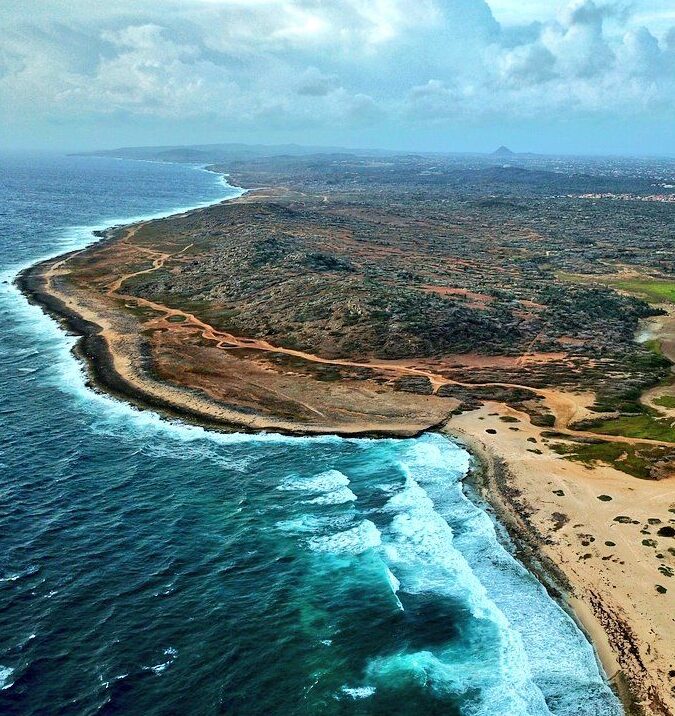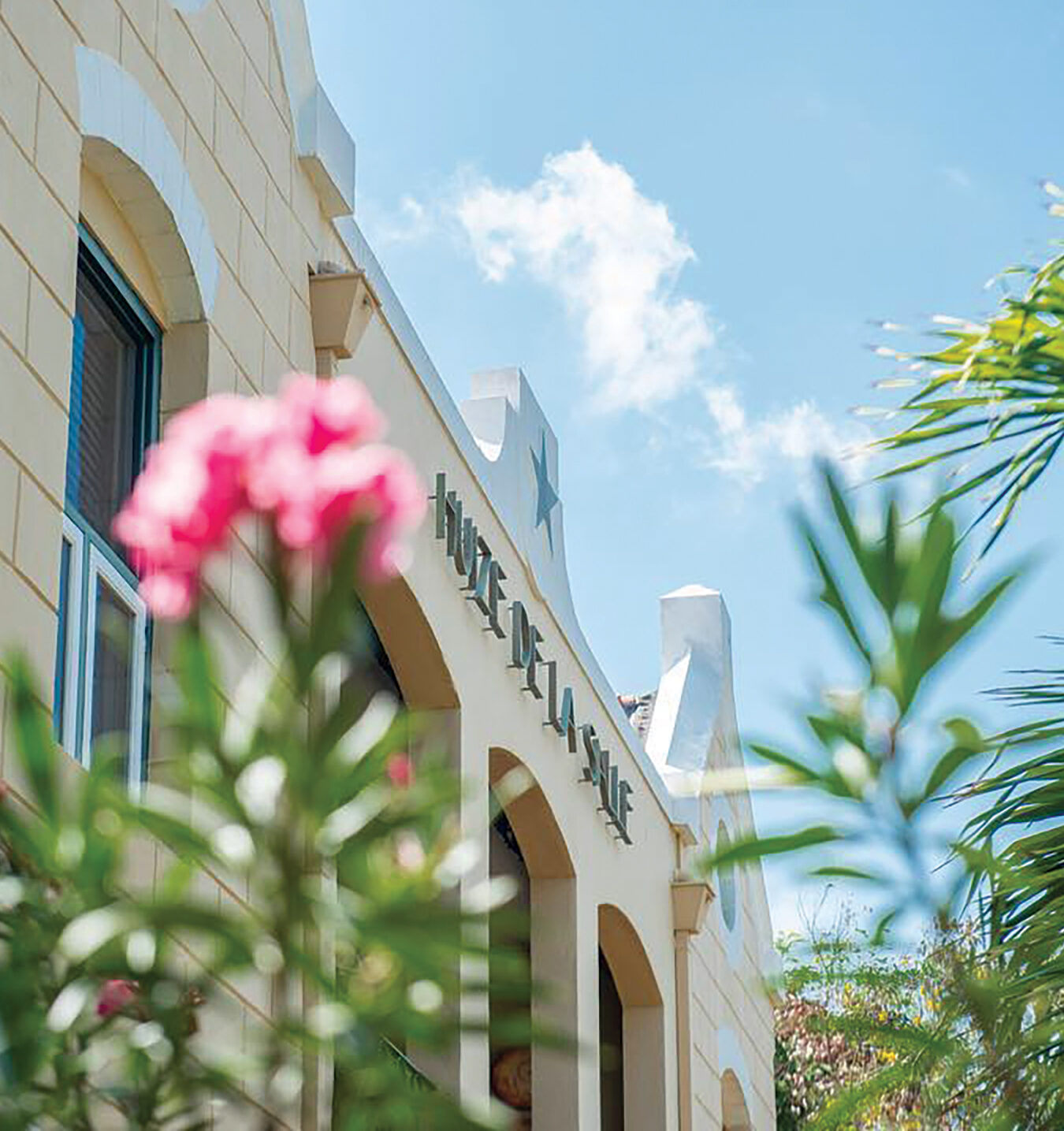Master in Sustainable Engineering
A new generation of scientists and professionals for sustainable development.
The graduate program in sustainability for engineering (MSc in Sustainability for Engineering) builds on fundamentals to support professionals to develop and implement specialized solutions for sustainability challenges for small island contexts. The program is designed for students who have a strong technical background in engineering or in the natural sciences at a BSc or MSc degree level.
A graduate of this program has a sustainability focus that does not only take into account the environment in project design, but also takes into account societal, governmental and economic impacts of choices made.

Sustainable development is needed for all countries
Sustainable development is on the global agenda, but especially small island states are vulnerable due to their small size and the many (largely external) challenges they face. Higher education needs to play a pivotal role in the implementation of sustainable development policies and the corresponding Sustainable Development Goals (SDGs).
For small island states, besides local governance strategies, local universities play a crucial role in the implementation of the SDGs due to their contextual embeddedness and their knowledge of that specific island state. This is what SISSTEM is about.
The graduate program in sustainability for engineering (MSc in Sustainability for Engineering) builds on engineering fundamentals to support professionals to develop and implement specialized solutions for sustainability challenges for small island contexts. The program is designed for students who have a strong technical background in engineering or in the natural sciences at a BSc or MSc degree level. Students with combined educational and professional experience in a single specific exact science domain such as physics, mathematics, data sciences, computer sciences, biology, chemistry or environmental sciences, or who do not have all necessary background knowledge, qualify too, but may need to take up to 30 EC in additional courses from the SISSTEM Bachelor program to complete the degree and demonstrate the conceptual knowledge that is expected of a graduate from this program. Students with a vocational bachelor diploma will have to take up the entire 30 EC Integrated Pre-Master Program. The additional courses will not be included in the exam program of the MSc. Diploma, but students can obtain a certificate for every course passed.
The MSc has three specializations: Bio-Environmental Sciences; Information and Data Sciences; Technology and Engineering. Candidates who participate in this program choose their specialization at the moment of registration. At least 50 percent of class assignments as well as the thesis have to be executed within the framework of that specialization. Proof of completion of the specialization is included in a separate portfolio that is assessed by the program committee.
A graduate of this program has a sustainability focus that does not only take into account the environment in project design, but also takes into account societal, governmental and economic impacts of choices made.
Learning outcomes
The program focuses on knowledge of and skills…
- To have thorough understanding of the core sustainable engineering principles and to acquire an engineering attitude within a generic and discipline-specific context: result-oriented attitude, attention for planning and technical, economical and societal boundary conditions like sustainability, risk and feasibility assessment of the proposed approach or solution, focus on results and achievement of effective solutions, innovative and transdisciplinary thinking.
- To have system-oriented and application-oriented knowledge understanding and (engineering) skills at an advanced level within specific fields of application.
- To address a problem within a well-defined framework and to plan and develop a project independently, with attention being paid to the technical and social preconditions and with special attention being paid to the contextual factors of small island states.
- To act from a research attitude, including creativity, accuracy, critical reflection, motivation of choices on scientific grounds to independently conceive, plan and execute an engineering project at the level of a starting investigating professional.
- To be able to conduct problem-oriented formulation and analysis of complex problems of small island states, by dividing these into manageable subproblems and designing sustainable island solutions for specific cases with attention for the application possibilities and broader conceptual impact.
- To have advanced knowledge of the various fields of application of STEM in a historical, social and future-oriented perspective, with a special focus on sustainable solutions for small island states.
- To be able to understand and apply essential methods and tools, including life cycle assessment, quality and certification standards and statistical process control to ensure process maintenance and reliability, sustainable design, material flows analysis, pinch analysis etc.
- To be able to take into account key environmental, social and economic considerations and how they can be integrated in a technological design when developing sustainable solutions for small island states and evaluating projects and policies, via tools and methods including cost-benefit analysis, contingent valuation methods, choice experiments and environmental valuation techniques, etc.
- To have advanced system and application oriented insight in multiscale concepts (micro-, meso-, and macroscale), which allows to structure and model human-made and natural processes and systems, taking into account their dynamic character and adaptive behavior.
- To be able to design innovative and application-oriented systems, products, services and processes and be able to extrapolate these with attention for the business context and to be able to extract new research questions from challenges encountered.
- To have the ability to communicate the results of technical and scientific work correctly and clearly in writing, orally and graphically, to colleagues and laypersons.
Planning
- 2 year half time program nominal.
- Maximum 4 year time of completion.
- In case the integrated pre-master has to be followed, the maximum time of completion is 5 years.
- In case courses included in the pre-master are not considered to be a direct pre-requisite for master modules, they can be followed simultaneously with the master modules.
Program
General criteria
The program is designed for students who have a strong technical background in engineering or in the natural sciences at a BSc or MSc degree level. Students with combined educational and professional experience in a single specific exact science domain such as physics, mathematics, data sciences, computer sciences, biology, chemistry or environmental sciences, or who do not have all necessary background knowledge, qualify too, but may need to take up to 30 EC in additional courses from the SISSTEM Bachelor program to complete the degree and demonstrate the conceptual knowledge that is expected of a graduate from this program. Students with a vocational bachelor diploma will have to take up the entire 30 EC Integrated Pre-Master Program. The additional courses will not be included in the exam program of the MSc. Diploma, but students can obtain a certificate for every course passed.
For more practical information about student life at UA, the facilities the university offers, and information about your registration or changes in your personal information, contact the Office of Student Affairs.
Our online registration opens from May 15th until July 15th. Click on the online registration link below, which will be visible during the registration period. You will be directed to the application portal Osiris. If you’re a new student, create an account and submit your application. Once you have submitted your application, you’ll receive an email confirmation and instructions on how to submit any required hard-copy documents to the University.
The deadline for submission of your application is July 15. The University of Aruba reserves the right to deny any application submitted after the deadline.
Career opportunities
A graduate of this program has a sustainability focus that does not only take into account the environment in project design, but also takes into account societal, governmental and economic impacts of choices made.
Further education
After obtaining a Master of Science degree in Sustainable Engineering you are eligible for post graduate and PhD programs.
Testimonial 1
For students with beta subjects, there are not many choices for further study after high school in Aruba. Fortunately, SISSTEM is realized on our island in collaboration with KU Leuven. SISSTEM is very all-rounded and one learns a lot in a short time. What one studies does not only stick to theory, but can often be applied directly in the real world. The topics concern real situations that often require urgent solutions with the looming background of climate change and all its consequences. Issues that increasingly and regularly enter our homes via TV images and other media, like catastrophes, such as floods, hurricanes and wild fires where one normally watches helplessly, now might be part of this fascinating study, where one can possibly contribute to mitigate future occurrences.To know that you can actually do something to improve world problems is intriguing, motivating and empowering. We stay up to date with the latest developments through machine learning, data science, environmental science and a lot more. Very nice is that in between studying there are educational field trips. In this way, you get to know and explore your island and you know where the bottlenecks are that you can work on.You learn to see your island from a completely different perspective. You are curious where this path that you have embarked on, will eventually lead in the light of your new study.
If you are into bèta subjects and the environment, you should also include SISSTEM in your system!
Elizabeth Hofwegen
SISSTEM Student
Testimonial 2
Since its launch, I have been pleased to be a part of the inaugural Master’s cohort in Sustainability for Engineering in the UA at SISSTEM. I applied while keeping my full time position as research coordinator for a small sustainability-oriented foundation, and so far my studies have only added to the impacts of the work we do. The foundation’s mission is to leverage open source knowledge for community-led sustainable development. The MSc. offers a great fit for me to boost my efforts in community level innovation for small island sustainable development.
From the first semester, I have already had the opportunity to launch research projects measuring the potential for small-scale plastic recycling, modeling shallow seafloor habitat, and initiating my thesis research which aims to develop a mapping toolkit specifically aimed for replication among small islands. In the early lessons I received the advice to pace my ambitions, to ensure success in the program, but I can only imagine what further accomplishments are possible within the coming months.
Anthony Sevold
SISSTEM Student
Testimonial 3
Why did you choose to audit a master module at SISSTEM?
I chose to audit a module because it aligns with my scope of work, which involves data analysis, visualization, and modeling. As an environmental consultant and researcher, I regularly provide reports on local environmental topics. This often requires me to collect and analyze large amounts of data using appropriate methods and models. Acquiring new skills in data analysis will enable me to provide sound and knowledge-based recommendations. Ultimately, this will help me contribute more effectively to my field. I hope that by sharing my positive experience with this course, others might see the value it can bring to their field of interests.
How has the experience been so far?
I really love it! I was concerned that the topic of modeling would not align with my educational background, however the professor explains the topic so well by giving real-life examples and integrating our own research topics in the explanations. I have gained a lot of new knowledge and insight into data modeling and analysis methods, which I am able to apply directly in my work. For instance, for the project assignment we will look at which type of model we should use for a specific objective within our field of work. I have chosen to focus on finding the best models for analyzing satellite imagery data to map shorelines and bathymetry. I am then able to validate the accuracy of satellite-based shoreline and depth measurements. Therefore, these assignments are directly contributing to my own work. I hope others can see how this course might help them as well.
Tatiana Becker
Auditor
Tuition fees
| Student | Program | Study load | Total tuition |
| Local | Master | Part-time | AWG. 4.500 (Excluding AWG. 500 admin fee) |
| International* | Master | Full-time | 4 times the local tuition fee |
*International students are non-Dutch passport holders who have resided in Aruba for less than 5 years.
Important dates
Deadline first payment: September 1
Deadline second payment: January 5
University of Aruba
Phone: +297 526-2200
stem@ua.aw
J.E. Irausquinplein 4
Oranjestad, Aruba

*This is funded/co-funded by the European Union. Its contents are the sole responsibility of and do not necessarily reflect the views of the European Union.




